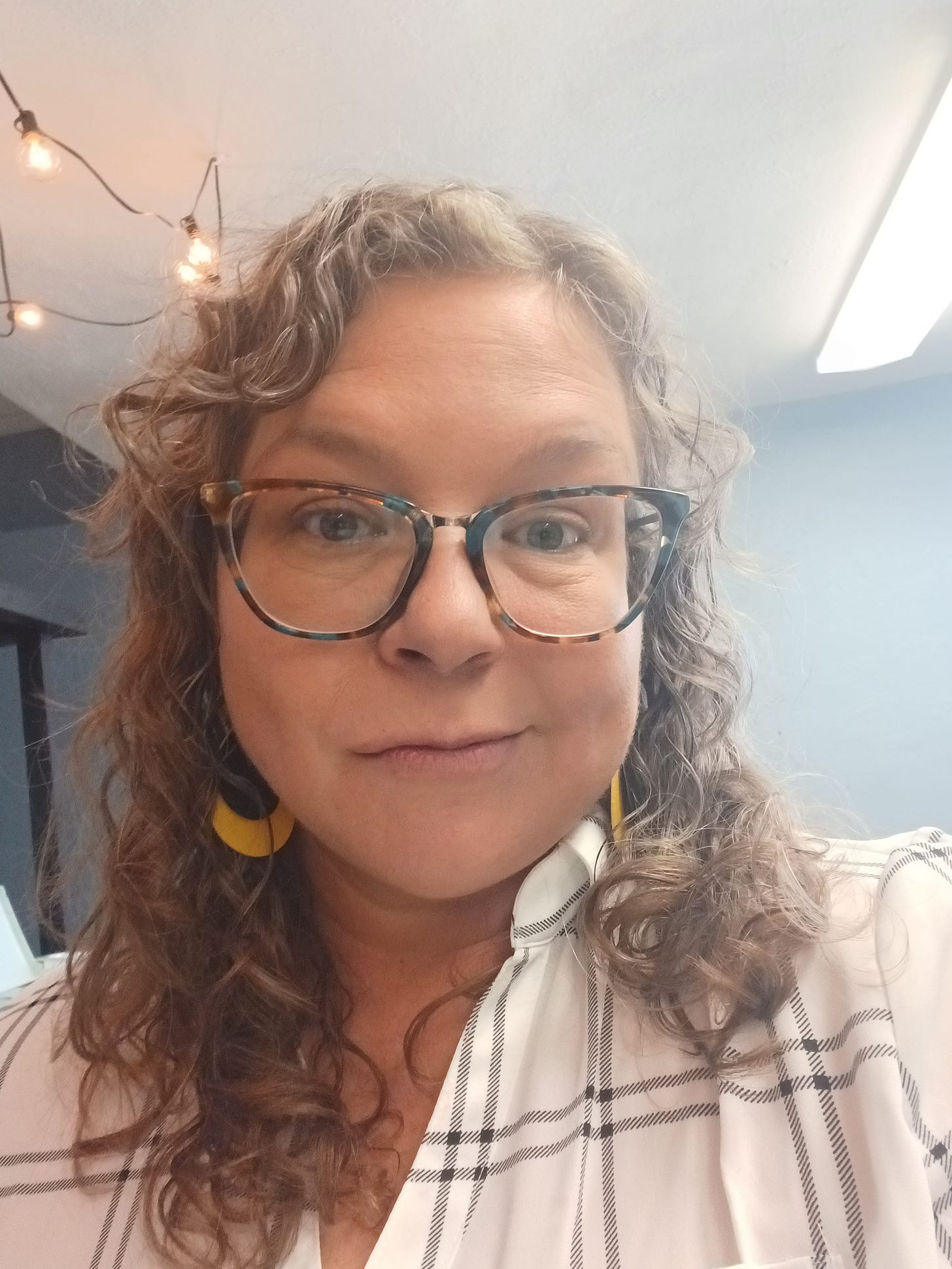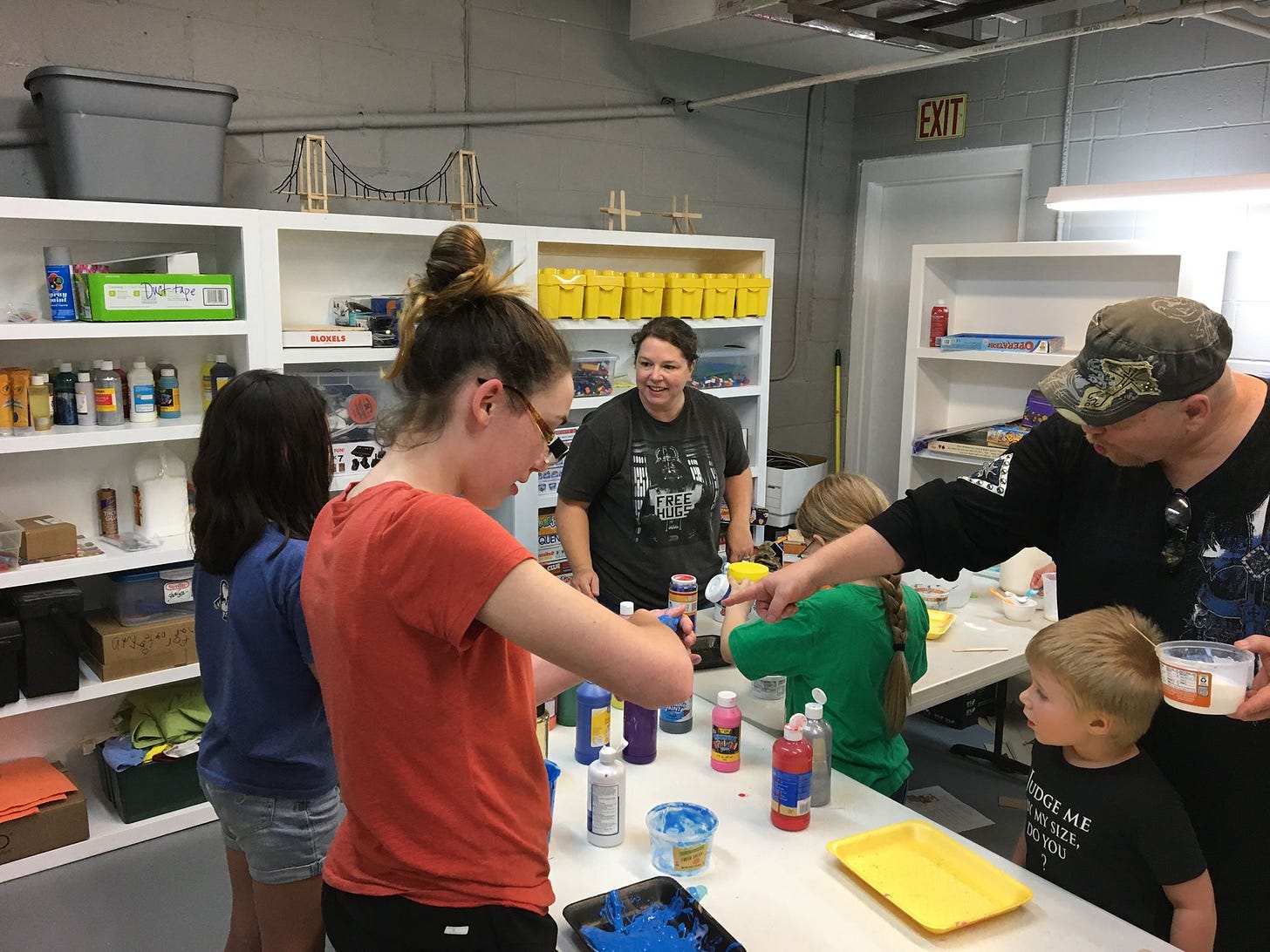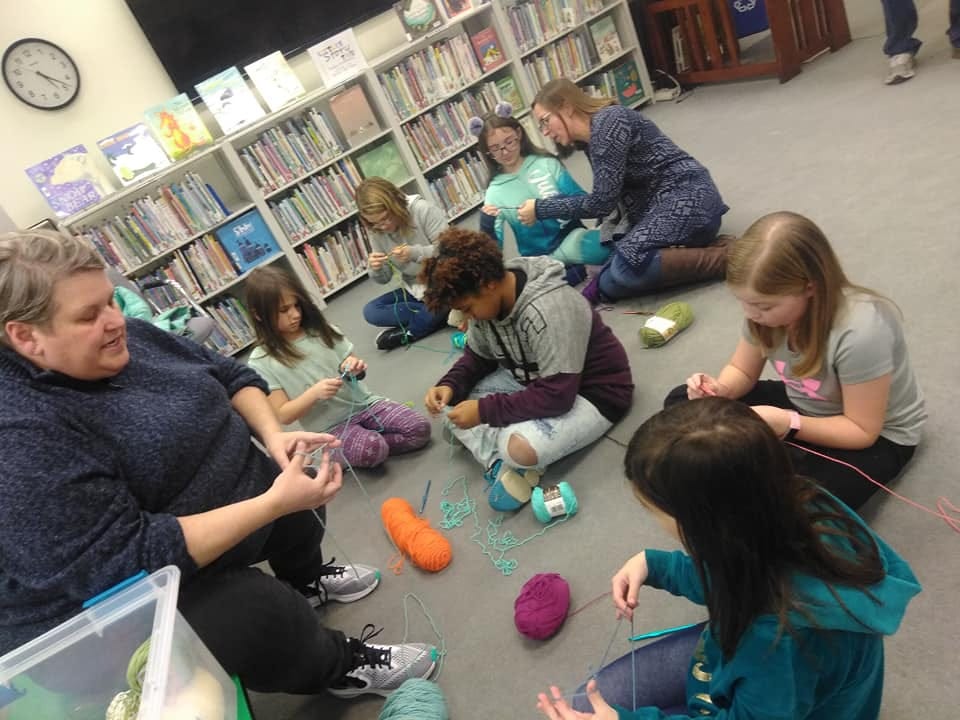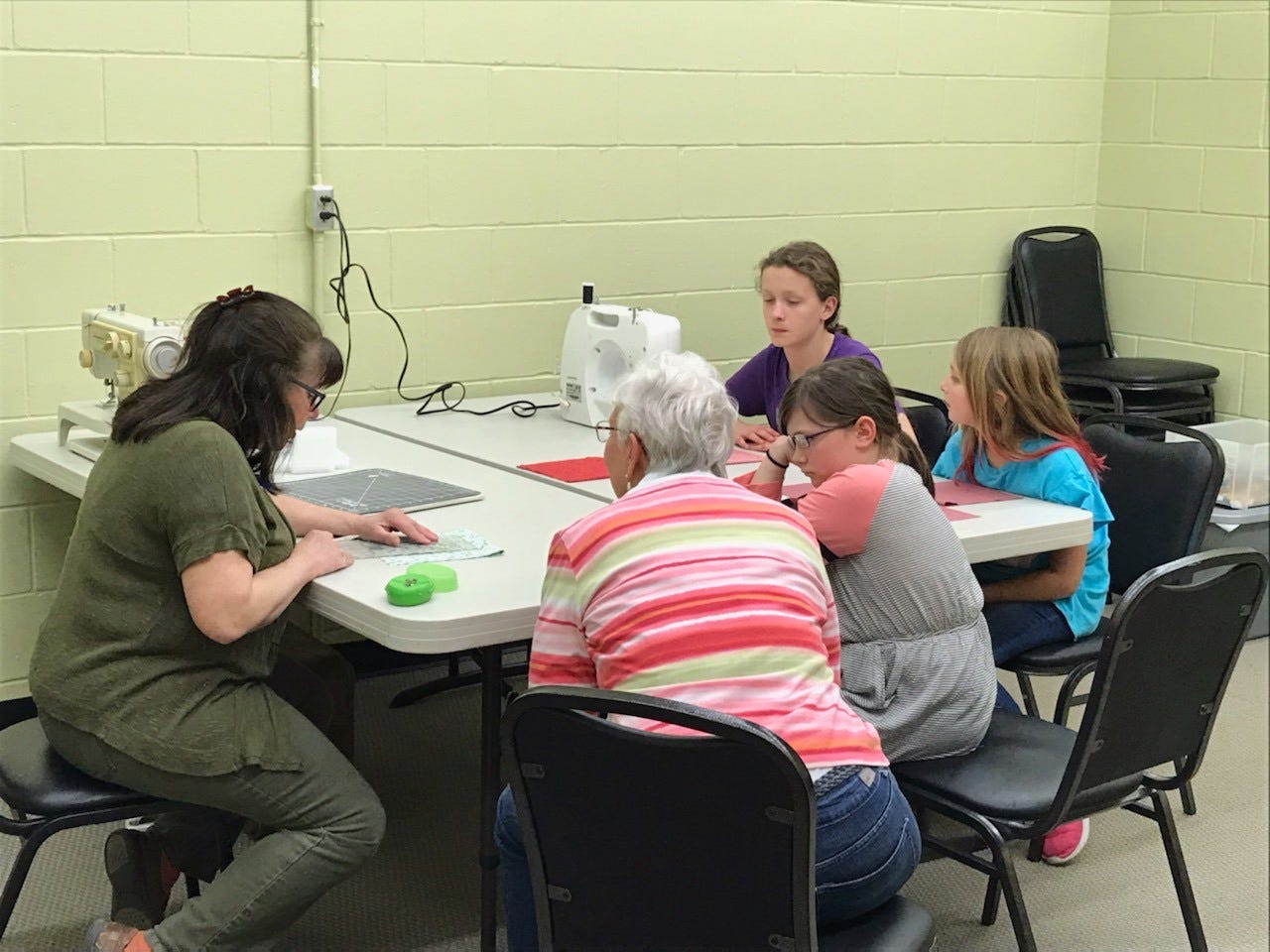Show Me a Library Maker
Jennifer Ensign organizes making in Cameron Public Library in Missouri
Jennifer Ensign is the Children's Programming Coordinator for Cameron Public Library. Cameron, Missouri is about an hour north of Kansas City.
Dale: Tell me where Cameron Public Library is.
Jennifer: Very rural. Honestly, Kansas City is the closest metropolitan area to us. We serve a population of about 9,000. We're just a city library, so only city taxes come to us. We we serve a fairly low income population. Really there's just not a lot of opportunities that are close by for enrichment and learning and things like that, other than the local school district.
I started here about seven years ago. Over time my position has grown to encompass serving children in the area from ages five to 18. I wear a lot of hats, as all rural libraries' library staff does.
Dale: So when and how did you introduce maker programs in your library?
Jennifer: For me, personally at the time that I started here, I had a sixth grader who was very interested in coding. There really wasn't a lot of opportunity for him to learn about that here. So I learned it with him. I saw that a lot of his friends were interested in the same things, but as far as extracurricular activities in this community, it just wasn't an option.
There were some computer science focused and coding specifically focused courses at the high school level, but nothing up until that point. I've talked with my director and said, I think that this is a need here in the community. I was fortunate enough to get some grants from the state to help us get started, get us materials and things like that. I started doing coding camps, coding clubs, going to the schools and talking to them about stuff. Then it grew from not just coding, but to making in general, and STEM learning. More open exploration-type activities, less instructional.
Dale: What's the response been?
Jennifer: It's been amazing. Pre-Covid, we had two different, very successful afterschool programs that almost got a little too big to handle with our small staff, but we grew it. We renovated an unused closet into a makeshift makerspace. Then Covid changed things for a while, so we ended up doing a lot of "take and makes" out of that space again. We are starting to get it built back up again to where it was. Honestly, we got to where we incorporate some kind of making in almost all of our programs now. Even if it's just a story time or a book club, there's usually some form of making that's involved with it.
Dale: How do you talk to parents about it?
Jennifer: It's a little out of their comfort zone, I feel like. The lack of specific instruction is not something that they tend to gravitate towards.
After they see the open access to the materials and just letting their children make something that just lets their full creativity go into it, and there's no right or wrong way to do it, they see the communication and the collaboration and the design thinking. When they see all that’s involved, they get right on board with it.
We have so many people that say that those are their favorite programs, as opposed to the more instructional type. Parents are almost a little bit relieved because the mess is here instead of at home.
Dale: Isn't it great that a library allows a mess?
Jennifer: Exactly. Just to have parents realizing that letting kids come up with their own ideas and start a project is great. That's wonderful. We've had a great turnout.
Dale: I keep saying this. I think the secret of a maker stuff is for students to do projects based on their own ideas and interests. If you can align those projects, and their ideas and interests and let them grow those ideas and interests and get more interesting projects over time, it's not just an activity, it's a process.
Jennifer: Oh, for sure. We definitely saw that with the coding kids that were maybe more reluctant to get involved into other programs that we do. The coding spoke to them and they were coming up with their own ideas for things that they wanted to create and really took off with it because they hadn't found that outlet to express that before.
Dale: Have you talked to teachers in the local schools about what you do and has it influenced them?
Jennifer: Before we started any of this, like whenever we first applied for the grant, we spoke to the computer teachers. We have a great relationship with our school district. We asked them what they see, especially at the high school level, as far as what kids already know, how much interest they're showing and took their advice under consideration. That kind of directed us to get started.
There's been occasions where I get to go into the schools and I bring my my stuff with me and spend the week there with their classes. So that's a great opportunity. I'm so thankful that they allow us to do that.
It's really helped build our relationship with the schools. Over time, I am seeing kids that were in our programs at younger ages that are now at the high school level, that are becoming leaders in their computer science department and Future Business Leaders of America (FBLA). They're coming and helping us run our coding camps for our younger kids now.
Dale: Are you going to have summer camps and things going on this year?
Jennifer: We are. We're actually taking it to a new level. Our theme for the summer is "All Together Now." We are trying to focus in not just on kids, but allowing adults and families and everyone to take apart in the experience. We're having a Maker Monday; that's four hours to come in and make stuff for all ages. Then a Tech Tuesday where anybody can come in and try our coding tools and get some assistance if they need to or just explore it.
Dale: So tell me about the Library Makers Group, which I saw on Facebook.
Jennifer: Yes. Library Makers is a new organization. It actually started as a grant program out of California. Lisa Regalla and Pamela Van Halsema. They started it in California like right before Covid. Then things got crazy, so they pivoted. They asked the libraries in California, what are they needing and what are they looking for as far as making goes?
They really wanted more of a network and support. So Pam and Lisa decided to take it to a national level after that grant had ended and created what was called at the time "Makers in the Library" and they started an application process to recruit charter members from all over the nation, rural and urban, to try to get voices from all different kinds of experiences.
I was accepted as one of the charter members. I've been with them for about a year and a half starting from basically just a group of us trying to figure out what we valued and what we wanted to make of this. And now we are growing it.
We've gotten our platform and our website has been established. We've got some basic programming that we want to offer to people, and we're starting to open it up to invite ambassadors to take it to the next level, to really grow it and provide support to makers and libraries all over.
Dale: Can any librarian join, or is it still an application?
Jennifer: Anyone can join. So our website is librarymakers.org. We h ave our Facebook page, which is the same name. It's a free platform. Anyone is welcome to jump in, network, share and take part. The ambassadors that we are looking for right now, they have a more specific role. We're looking for people to help us spread the word to their local areas. We're looking for representatives from school libraries, tribal libraries, academic, all of the different kinds of libraries. So it's definitely open. It is still in its baby stage.
Dale: What's amazing about libraries and their maker programs is that they've spread person to person, word of mouth. People learn about it and think how do I do that? They start doing it and then add a little bit at a time and, in your case, getting a closet or getting some other materials to work with.
What kind of advice do you give to a librarian who'd like to get into making, but isn't doing it yet?
Jennifer: The main thing I say is to start small. You don't have to have a 3D printer; you don't have to have all the fancy gear. Start with something that you are passionate about.
I got passionate about coding because I saw the need for my child to have that as an outlet. There's tons of different ways that you can start. Take it small. You don't have to have a whole set of 20 things. See what's gonna work for your environment. Go get a box of Legos and see how that takes over, and then just grow it step by step.
Do it so it's not so overwhelming.
Dale: Some people come at it from an arts and crafts perspective, which they might be familiar with. That's still making. It's really about getting comfortable with that and then add on other elements. Perhaps kids begin asking for things that they want to be able to do, like Legos or robots or whatever that might be.
Jennifer: I feel like especially libraries, we've had making all along. We just didn't call it making. Story time always has had a craft to go with it or something to that effect. There's always been summer reading program activities, but taking it as less of a instructional step-by-step thing and giving more autonomy to the participant to create what they want to make is what’s new.
Also, just getting your community involved because there's so many makers in your community.
Dale: That's a great point. You don't have to have all those skillsets yourself. In the ideal makerspace, you’d have different people that represent skillsets. Also, you mentioned something earlier, for libraries to have activities that mix adults and kids together, siblings of different ages. A group activity can be open to expression at different levels.
Jennifer: Oh, for sure. The thing I love most about our coding programs is there's always some kiddos that have no idea anything about coding. And there's always some that have been through some of our camps and our clubs before, so they have a better handle on it. Most of the time, if one of the newer people has a question, we don't have to jump in and answer it. The kids sitting next to them is more than willing to help them out and the collaboration and all of that it's the best part of it.
Dale: I really appreciate learning about you and Cameron Public Library in Missouri. Thank you. Good luck with Library Makers. It's wonderful what you're doing.
Jennifer: Thank you very much. I appreciate you reaching out to me. It was definitely unexpected.
(Photos provided by Jennifer Ensign and Cameron Public Library)







